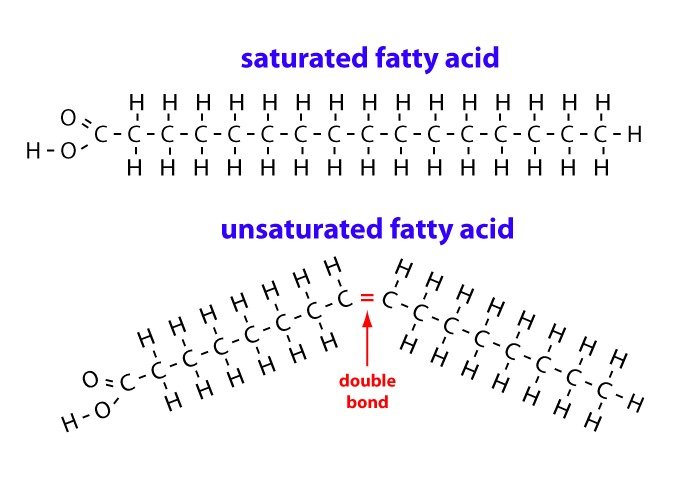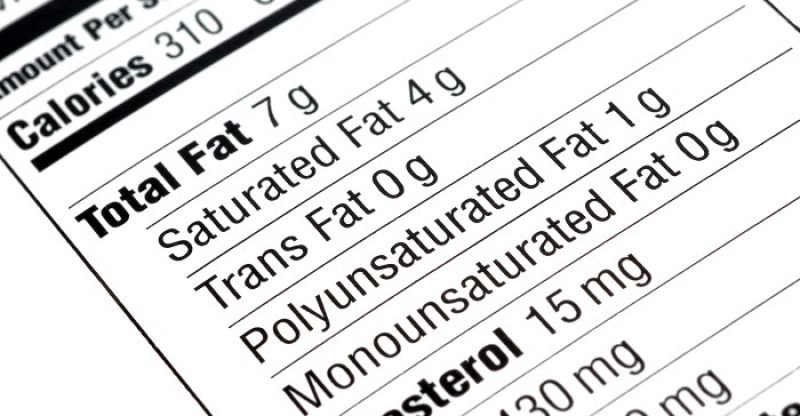Is Saturated Fat Good or Bad?
It seems as if we are continually being told new and improved information related to our health and well-being.
From the latest diet trends to something as simple as what was once thought to be incredibly healthy for us now is not so much.
In this brief article, we will be examining one of the latest new sources of information that has recently created waves in the healthy living world: is saturated fat actually good for us?
Read on to find out all the details, and see if everything you thought you knew about saturated fats is, in fact, wrong.
History of Saturated Fat
Throughout the 20th century, there was a huge influx of fat-free dieting that swept the nation.
This led to people discovering that fat really wasn’t the bad guy.
Fat was such a scary word that many people simply felt better by getting it out of their lives.
However, this did more harm than good.
Because so many foods that we started consuming during this period didn’t have the necessary fats that our bodies needed for fuel, we began to double and triple our intake of these foods just to feel satiated.
This, overall, led to a huge spike in excess sugars, starches, and calories, which ended up increasing the weight we were trying to lose!
Plain and simple, the low-fat diet craze of the 80’s and 90’s totally backfired on us.
Nowadays, the dietary advice that we get seems to be moving away from the ideology that all fats are bad for you, but instead toward the understanding of which ones are right for your body.
We have come to realize that fats are no longer the enemy, but that we need them!
But we also need to know that we don’t need all of them, and some of them we need in moderation.
From a general standpoint, we have been told that the best fats for our bodies are the unsaturated fats, which are: polyunsaturated (PUFAs), that can be found in certain oils like corn and sunflower oils, and also in omega-3s like fresh salmon and nuts like walnuts; the second fat is the monounsaturated (MUFAs), which are found in foods such as avocados and oils like olive oil, peanut oil, and safflower oil.
Both types of fats are excellent for helping to lower your blood sugar levels, your cholesterol, and also your overall risk of developing heart disease.
Dating back to the 1950’s, we have been told to steer clear of saturated fats.
Saturated fats can be found in food products like dairy, meat, and even certain plant-based products, and we have been warned that consuming saturated fats puts us at an increased risk for high cholesterol, stroke, and heart disease.
But new research actually shows that these saturated fats may not be to blame!

Is it Really so Bad?
After many years of claims that asserted that saturated fat was incredibly bad for one’s health, the medical community found themselves blown away when a 2010 study by the American Journal of Clinical Nutrition was released that clearly stated that research just couldn’t prove that there was any direct link between saturated fat and stroke or heart disease.
Interestingly, this wasn’t even the first time that saturated fat was noted not to be as bad as presumed.
Yet another study that was conducted in 2010, including 21 studies overall and a whopping 350,000 subjects, backed the same hypothesis that there was not a clear and direct link that saturated fat was to blame for heart-health issues.
Those research studies were basically out to refute the decades-old assertion of the “diet-heart hypothesis”, which is the presumption that states that saturated fat is bad for your heart.
The downside to this study was the fact that it was based mainly on short-term trials that analyzed cholesterol levels as well as on animal studies, and didn’t observe the risk of heart attack.
There really were no accurate controlled tests to be able truly to determine if saturated fat really was doing what research was claiming: causing high blood sugar and cholesterol, strokes, and heart attacks.
Cholesterol
When it comes to understanding truly how fats affect our body, we need to get a firm grasp on cholesterol, first and foremost.
Cholesterol is constantly being transported throughout your bloodstream via carriers that are comprised of proteins and fats (commonly referred to as lipids), called lipoproteins.
There are two forms of these lipoproteins whose job is to carry cholesterol to and from the cells in our bodies (1, 2, 3, 4).
The first one is a low-density lipoprotein, called LDL, and the other one is a high-density lipoprotein, called HDL.
LDL
LDL is considered to be the “bad” cholesterol. LDL contributes to the fatty build-up that occurs in your arteries (aka atherosclerosis).
These plaque build-ups, in turn, narrow your arteries and thus significantly raise your risk of having a stroke, heart attack, or even peripheral artery disease, which forms because of the narrowed arteries within your legs.
HDL
HDL is referred to as the “good” cholesterol.
HDL is basically a scavenger, as it carries LDL cholesterol out of your arteries and back into your liver.
Once it hits your liver, it gets broken down and then can successfully pass through your body.
When you have a healthy HDL level your body is actually far better protected against the risk of both stroke and heart attacks.
While HDL hasn’t been shown to eliminate LDL entirely, it can dramatically lower your risk of some of the aforementioned health conditions.
Triglycerides
The most common type of fat in your body is triglycerides.
These store excess energy that your body needs, and come directly from your diet.
When you have a high triglyceride level that falls, in combination with a high LDL or a low HDL cholesterol, you may find that your body will begin to develop fatty build-up in your arterial walls that can, in turn, increases your chances of having a stroke or a heart attack.
It is of the utmost importance to determine what your cholesterol levels are so that you can better manage the foods that you take in, and be able to understand better what foods you should and should not be consuming in order to maintain optimal health.
Cholesterol levels can easily be determined with a simple blood test at your local health provider’s office.(5)
Different Fats
All fats are different. Some are good for our bodies, some are neutral, and still, others are downright bad for us (6).
While an increasing amount of research is becoming available regarding the fact that both saturated and monounsaturated fats are perfectly safe and possibly even healthy for us, the polyunsaturated fats situation is a bit more complex.
Let’s break down the various types of fats to understand better how they affect our bodies, both for the good and bad:
Saturated Fats
Saturated fat has been proven to have tremendous positive effects on our body.(7)
Saturated fats have been shown to encourage the cells in your liver to process out fat cells, which assists your liver in being able to work more effectively.
They have also been shown to assist your white blood cells in being able to recognize and eliminate the bacteria and viruses that attempt to harm your body.
And, research has also indicated that consuming saturated fats can help to increase your body’s testosterone levels, which can assist in tissue repair, muscle preservation, and an improvement in sexual function.
Unsaturated Fats
Polyunsaturated and monounsaturated fats have been shown to help manage cholesterol levels, which can greatly assist in decreasing your risk of developing cardiovascular disease and can also help to regulate insulin levels and control your sugar intake.
Polyunsaturated fats provide your body with much-needed omega-3s and omega-6s, which are fatty acids that can help to protect against type 2 diabetes, irregular heartbeat, and can also help to lower your blood pressure.
Your body also requires these same omegas to promote proper brain function and development.
Trans Fat
Of all the fats, trans fat is the unhealthiest type of fat.(8)
It has been noted that trans fats can decrease your HDL while increasing your LDL cholesterol, which puts you at an increased risk of developing heart disease.
Consuming trans fats can also increase inflammation within your body, thus increasing your risk of the development of type 2 diabetes and cardiovascular disease.
When to Minimize Saturated Fat
While the vast majority of studies that have been conducted show no direct link between saturated fat consumption and the risk of heart disease, there are certainly people who should exercise caution prior to overindulging.
Some of these people may include individuals who have a certain genetic disorder that is called Familial hypercholesterolemia (9).
This disorder is caused by a defect on chromosome 19 and basically means that your body is unable to rid itself of LDL cholesterol from your bloodstream.
Others who should avoid saturated fats are those who have the gene variant called ApoE4.
ApoE4 can also increase your overall risk of developing atherosclerosis and stroke, along with vascular issues, dementia, and cognitive impairment. (10)
Genetics will most certainly continue to unlock more ways in which diet affects our individual risk for disease, but for now, those with the aforementioned genetic disorder and variant should strive to minimize saturated fat in their diets.
What to Eat
When it comes to ensuring that you are meeting all of your nutritional needs in terms of vitamins, minerals, and of course, fats, you are going to want to plan out carefully and properly the foods that you are consuming.
Here are some of the top rules of healthy eating that you should most certainly strive to follow:
Whole Foods
The fresher that you can eat, the better off you will be.
Be sure always to keep your body filled and fueled with nutrient-loaded and heart-healthy foods like nuts, legumes, whole grains, fish, fruits, and vegetables.
The more fresh foods you consume, the better off you will be when it comes to adding in saturated fats.
Don’t Overindulge
Everything should always be consumed in moderation when it comes to maintaining a balanced, healthy diet.
Though saturated fats may not be the worst thing in the world for you, they still aren’t as healthy for you as unsaturated fats.
You should still always opt for lentils, legumes, fish, and more healthy options, than using red meat or cooking with a ton of butter.
Low-Fat Dairy
Low-fat yogurts and milk are both really good choices to replace full-fat dairy products, as they have significantly fewer calories and as much vitamin D and calcium as their full-fat counterparts.
Read the Labels
A general rule of thumb that you should follow is always to read the label of whatever food it is that you are considering purchasing.
Always steer clear of foods that include statements such as “No Saturated Fat,” as they may be loaded with fillers such as sugar, refined flour, and sodium.
You should also be sure to avoid all trans fats and items that contain “Partially Hydrogenated Oils.”
These can be found in pretty much any food that is processed, and are tremendously bad for your health.
Watch Your Oils
When it comes to oils, be sure to try and opt for liquid vegetable oils such as sunflower, safflower, canola, and olive oil.
Liquid vegetable oils contain a mixture of MUFAs and PUFAs (your healthy fats, monounsaturated fatty acids, and polyunsaturated fatty acids).
While coconut and other solid oils are a healthy option, they haven’t yet been proven to be as heart-healthy as the liquid vegetable oil options.
Carb Count
You should always be careful about how many carbs you are consuming on a daily basis, particularly if you are trying to lose weight.
Always monitor your carbs, and you should be receiving them from whole grains, fruits, and veggies, and not from heavily processed, refined foods like white sugar and crackers.
Dark Chocolate
If you find yourself craving sweets on a fairly consistent basis, you may want to keep some dark chocolate on hand to indulge in on occasion.
Eating about an ounce a day will not be harmful to your health in any way, and dark chocolate is also packed with flavonoids that have been shown to act as an antioxidant that can help to protect your body’s cells from damage.
Some Things to Remember
While saturated fats can be healthy for the vast majority of us, it should be emphasized that the foods should be naturally high and not processed.
Some of the best sources of healthy saturated fats that you may want to include in your diet are: naturally fed/raised meats, dairy products from grass-fed cows, dark chocolate, and coconut.
Saturated fats are also excellent for cooking.
Due to the fact that they have no double bonds, they are highly resistant to heat-induced damage, whereas polyunsaturated fats easily become oxidized when they are heated.
Some good saturated fats that you may want to take advantage of cooking with are lard, butter, and coconut oil.
These are also the preferred options for high-heat cooking methods, such as frying your foods.
Our bodies can’t create Omegas on their own, which is why we need to rely on incorporating them into our diets to receive all their incredible benefits.(11)
There are three different kinds of Omega-3s: EPA (eicosapentaenoic acid), ALA (alpha-linolenic acid), and DHA (docosahexaenoic acid).
The two most important ones are EPA and DHA, both of which are found in seafood like sardines and salmon.
ALA can be found in certain plant-based foods, such as certain seeds and nuts, and also in high-quality cuts of meats such as grass-fed beef.
Conclusion
Health officials and researchers have spent an incredible amount of time and money on trying to link the potential risks of saturated fat consumption with the development and onset of heart disease.
However, it remains all too clear, as further testing and research results are becoming available, that there really isn’t any downfall to eating foods that contain saturated fats.
As is the case with everything, however, saturated fats should most certainly be consumed in moderation.
Just because a nutrient may be linked to some health benefits does not give you the green light simply to overindulge, especially if you have any of the aforementioned genetic health issues.
Do some research and figure out what is best for your personal health needs, and you will certainly reap the rewards!
FDA Compliance
The information on this website has not been evaluated by the Food & Drug Administration or any other medical body. We do not aim to diagnose, treat, cure or prevent any illness or disease. Information is shared for educational purposes only. You must consult your doctor before acting on any content on this website, especially if you are pregnant, nursing, taking medication, or have a medical condition.
HOW WOULD YOU RATE THIS ARTICLE?






